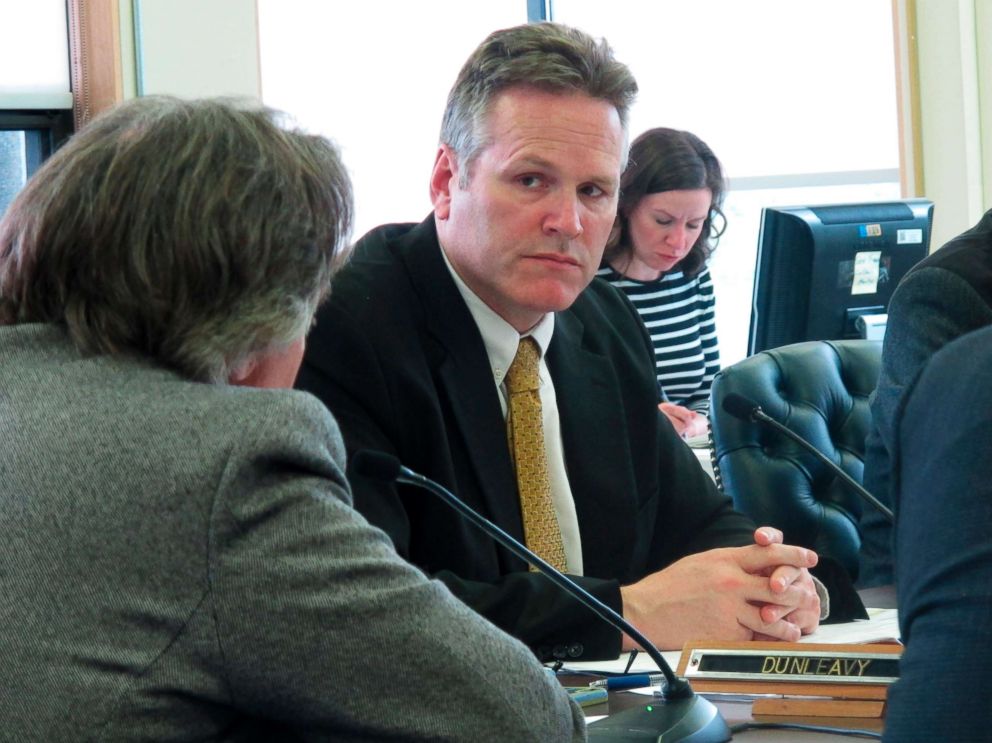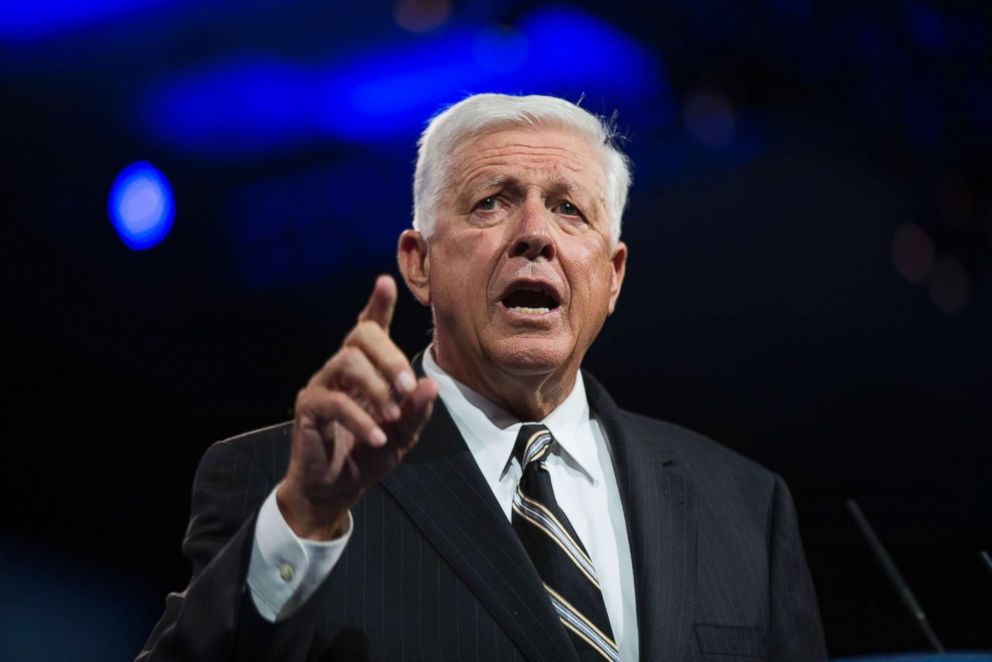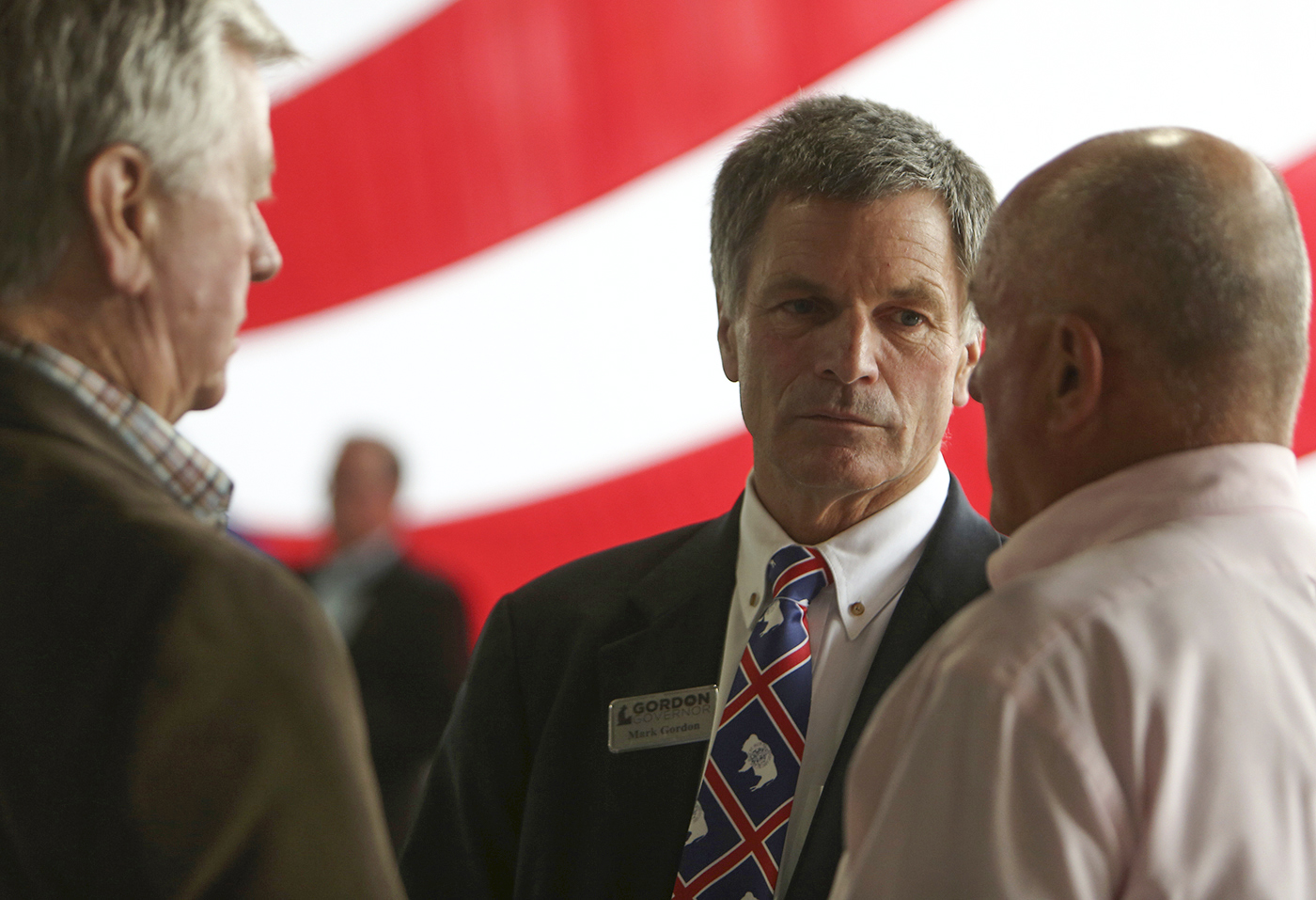Gordon, Throne will face off in Wyoming gubernatorial race; Dunleavy projected as GOP gov candidate in Alaska
In Alaska, a potential three-way race is worrying the incumbent and Democrats.
Voters in Alaska and Wyoming headed to the polls Tuesday, and gubernatorial races took center stage in both low-profile states.
Mark Gordon has bested the President Donald Trump-endorsed Foster Freiss to snag the Republican nomination for governor in the Wyoming gubernatorial primary, The Associated Press projects. Current Gov. Matt Mead was term-limited, and the fight to replace him was hotly contested between Gordon, state treasurer, Freiss, a GOP donor, and businessman Sam Galeotos.
Gordon will face former state Rep. Mary Throne on the Democratic side, the AP projects. Wyoming has not had a Democratic governor since 2011.
In Wyoming's Senate race, incumbent Sen. John Barrasso is projected by The Associated Press to have won the Republican nomination in a crowded race that included wealthy investor Dave Dodson. Dodson invested $1 million of his own money in his campaign.
Barrasso's opponent will be businessman Gary Trauner, who ran unopposed on the Democratic side.
In Alaska, one of the most politically idiosyncratic states in the country, a three-way race for governor is developing that has both the state’s Independent Gov. Bill Walker and Democrats worried that an easy path for a Republican victory in November is taking shape.
Former state Sen. Mike Dunleavy is projected by the AP to win the GOP primary for Alaska governor. He bested former Lt. Gov. Mead Treadwell.
The entry into the Alaska race by former Sen. Mark Begich, one of the most well-known politicians in the state, has complicated what was already a tough re-election bid for Walker, who has taken criticism for cutting into the state’s unique welfare system that is funded by revenue from oil production.
Begich ran unopposed on the Democratic side, while Walker got on the November ballot through collecting enough signatures.
Walker has until Sept. 4 to decide whether to stay on the ballot and fight out a three-way race until November or cut a deal that involves someone dropping out of the race.
In staunchly conservative Wyoming, the governor’s mansion is almost certain to remain in GOP hands come November, but the Republican primary promised to be a competitive race between long-time party mega-donor Foster Friess, State Treasurer Mark Gordon, attorney Harriet Hageman and businessman Sam Galeotos.
Friess has faced criticism that he is simply trying to "buy" the governorship in the state, and has blanketed the state with more than $1 million in advertising throughout the primary, the most of any Republican in the race. At a recent debate Hageman attacked Friess as a "part-time Jackson jetsetter," and declared that, "Wyoming is not for sale," according to the Casper Star-Tribune.
President Trump weighed in on the race Tuesday morning, endorsing Friess over Twitter and praising him as "Strong on Crime, Borders & 2nd Amendment."
In addition to both gubernatorial races, both of the states’ at-large U.S. House seats are up this cycle, as well as the Wyoming U.S. Senate seat currently held by GOP Sen. John Barrasso, who is seeking a third term.
Barrasso, an Trump ally on Capitol Hill, is facing a primary challenge from businessman Dave Dodson. Trump called Barrasso "absolutely outstanding in every way," in a late July tweet, attempting to boost the incumbent ahead of the primary.
Polls close in Wyoming Tuesday evening at 9 p.m. eastern time, and the polls in Alaska close at midnight eastern time.
Legacy, incumbency create a GOP opening in Alaska
A former carpenter and worker on the Trans-Alaska Pipeline, Bill Walker's path to the Alaska governorship was complicated to say the least.
After a failed gubernatorial bid to unseat Alaska's Republican Gov. Sean Parnell in 2010, Walker, the former Republican Mayor of Valdez, decided to forgo another GOP primary and began to gather signatures to appear on the general election ballot.
But after failing to form a political coalition, Walker switched his party affiliation to undeclared and formed a so-called 'unity ticket' with Alaska Native leader Byron Mallott, the Democratic gubernatorial nominee.
The alliance between Walker and Mallott narrowly prevailed over Parnell in the general election by just over 4,000 votes. Walker enjoyed broad popularity early in his term, but faced with an economic downturn due to a drop in oil prices decided to make cuts the Alaska Permanent Fund (APF), the welfare system that pays dividends to every Alaskan that gets its funding from oil money.
The move was criticized by both parties, but Walker defended it as a way to preserve the AFP's long-term viability, saying at the time that if the system is not fixed, "it will go away in the next couple of years."
The 2018 race was upended by the late entry of Begich, a former Anchorage mayor that represented the state for one-term in the U.S. Senate from 2008 to 2014, and endorsed Walker's gubernatorial bid in 2014, even though Walker did not do the same for Begich's re-election bid.
Walker again opted out of a primary against Begich and again said he and Mallott would run as a unity ticket for a second time.

Begich's bid has fueled Democrats' hopes that they can capture the governorship in a state that skews heavily Republican at the presidential level but has also legalized marijuana and often embraces more liberal positions on social issues like abortion. The Democratic Governors Association (DGA) praised Begich's decision to enter the race.
"Mark Begich’s candidacy gives Democrats a strong opportunity to retake the governorship in Alaska," DGA Executive Director Elisabeth Pearson said in a statement in early June after Begich's announcement.
At a recent campaign stop in the town of Homer, Begich referenced the surprise 2010 victory in the state by Sen. Lisa Murkowski, who lost a GOP primary before going on to win the general election as a write-in candidate, as evidence that there is a path to victory in a three-way statewide race.
“The first thing I’d say, in a three-way race for U.S. Senate, Lisa Murkowski won with 39 percent — and you had to write in her name,” Begich said, according to the Homer News.

The presumptive Republican nominee is former state Sen. Mike Dunleavy, who is locked in a two-way race with former Alaska Lieutenant Governor Mead Treadwell. Dunleavy has run as a "tough on crime" Republican and in an ode to President Donald Trump is touting his plan to "Make Alaska Safe Again."
"The explosive growth in violent and property crime that Alaska has experienced in recent years demands an aggressive response," warns Dunleavy's campaign website, "Alaska now leads the nation in almost every category of crime, making our state the most dangerous in the country."
Dunleavy consolidated local support early and has the endorsement of Parnell and GOP Sen. Dan Sullivan, two of the most powerful political forces in the state. Treadwell did not enter the race until June 1, well into the primary process.
The possibility that Begich and Walker could split the vote among the state's large population of political independents is what continues to fuel GOP hopes that they could re-take the governor's mansion in 2018.
A GOP mega-donor makes a run at the Wyoming governor's mansion
It is likely the governor's mansion in Wyoming will remain in GOP hands come November. The state has sided with the Republican nominee for the last two cycles by more than 40 points, and Democrats are not expected to invest in the race considering the large number of more viable pickup opportunities elsewhere.
The real action Tuesday night will be in the GOP primary for governor, where GOP mega-donor Foster Friess, who was the main booster behind former Pennsylvania Sen. Rick Santorum's 2012 presidential campaign, is facing off against State Treasurer Mark Gordon and a field of four other challengers that include attorney Harriet Hageman and businessman Sam Galeotos. Wyoming's Republican Gov. Matt Mead is term-limited this cycle.
Friess has pledged to serve only one term as governor and would donate his salary to a charity of Wyoming voters' choice, his assistant Bailey Shelbourne confirms to ABC News in April when he announced his bid. Friess, a 78 year-old former investment manager whose net worth was in 2012 rumored to be upwards of $530 million according to the Wall Street Journal, was also rumored to be interested in a bid for the U.S. Senate this year, but would have had to defeat a sitting senator in Barrasso.
Both Friess and Galeotos have tied themselves closely to President Trump, but Friess scored the backing of the president's eldest son, Don Jr., an endorsement he trumpets on the front page of his campaign website. Friess also has the backing of Santorum and Kentucky GOP Sen. Rand Paul, while Gordon has the backing of local Republican heavyweights like former Republican Sen. Alan Simpson, who represented the state in the U.S. Senate for nearly two decades.

Friess is also known for a cringe-worthy comment he made to MSNBC's Andrea Mitchell back in 2012. When asked about Rick Santorum's focus on social issues like access to contraception, Friess told Mitchell: "This contraceptive thing, my gosh it's such inexpensive -- back in my days they'd use Bayer Aspirin for contraceptives, the gals put it between their knees, and it wasn't that costly."
Friess later apologized for the comment, writing in a blog post: "My aspirin joke bombed as many didn’t recognize it as a joke but thought it was my prescription for today’s birth control practices."
Gordon ran unsuccessfully for the U.S. House in Wyoming in 2008, losing the Republican primary to Cynthia Lummis, who went on to win the seat and served in Congress for almost a decade. Gordon was appointed to the position of Wyoming State Treasurer in 2012 and won a full term in the office in 2014.
The Republican primary has been a pricey battle, with Friess dropping $550,000 on television advertising, the most of any GOP candidate, according to the Casper Star Tribune.
The race will also be another test of the strength of self-funding candidates this cycle. Friess has loaned his campaign $2.4 million, while both Galeotos and Gordon have given their bids over $1 million each, according to a local organization that tracks state campaign finance filings.
The leading Democratic candidate in the governors race is former Wyoming House of Representatives Minority Leader Mary Throne, who is facing three challengers on Tuesday for the nomination. If she wins the primary on Tuesday, Throne will be the 10th female Democratic nominee for governor this cycle, and the 14th overall, a record number according to the Center for American Women and Politics at Rutgers University. The ten female gubernatorial nominees for Democrats will also be a new high-water mark for a major political party in one election cycle.




